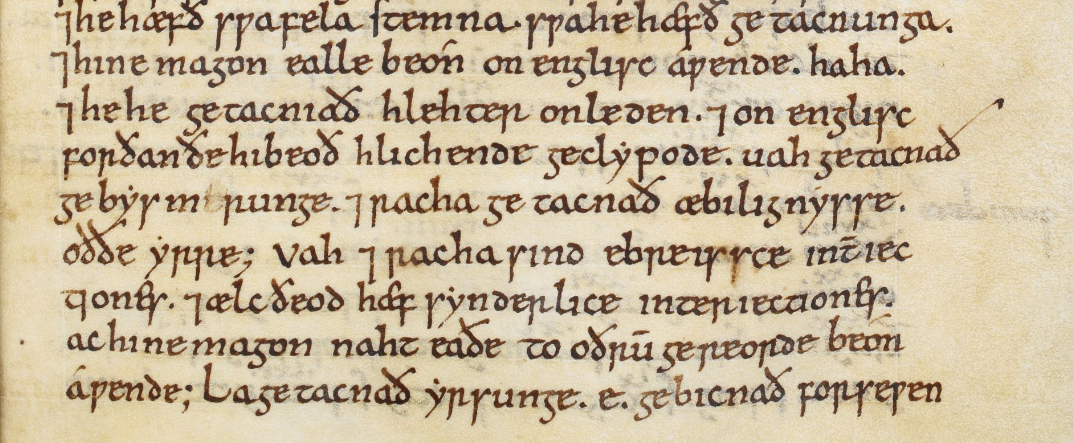Reading time: 5-10 minutes For this month, I’d like to highlight a phonological phenomenon that should be part of the conceptual toolkit of all etymology fans. It’s something that’s happened in the history of English, and in languages that have gone on to influence English. Awareness of this change can therefore clarify and connect allContinue reading “Humble Thimbles and Thor’s Thunder”
Tag Archives: old english
The Fates of the Dual
The Story of Indo-European’s (Mostly) Lost Number Reading time: 10 minutes Introduction One book, many books. One cat, many cats. One woman, many women. One sheep, many… well, also sheep. In Modern English, the grammatical options for nouns are limted to two. A given noun can be singular, referring to one individual thing, or plural,Continue reading “The Fates of the Dual”
Streets Ahead: When Roman Roads Met Old English
Reading time: 5 minutes (With my apologies to subscribers for the second email, following an accidental premature publication) I’m very keen to share a fun linguistic adventure that I found myself on this week, as I dug down into the history of the humble English word street. It all began with a Patreon post byContinue reading “Streets Ahead: When Roman Roads Met Old English”
Christmas Trees and Etymologies
Reading time: 5 minutes As an etymological Christmas gift from me for 2023, here’s a quick dive into the story and connections of one festive word: the humble Christmas tree. Now, Modern English tree goes back to Old English trēow, which could mean a specific tree or the substance of wood. … Ġeseah iċ wuldres trēow,wǣdum ġeweorðode, wynnum sċīnan,ġeġyred mid golde; ġimmas hæfdonbewriġene weorðlīċeContinue reading “Christmas Trees and Etymologies”
Five Antiquities of English
Reading time: 10-15 minutes To listen along in an audio format, just click here: IT’S WELL KNOWN that English has undergone many significant changes down the centuries. Events like the Norman Conquest have drastically altered the shape of the language, influencing words and sounds so much that a new kind of English was born. YetContinue reading “Five Antiquities of English”
Holy Linguists! Part II: Cyril and Methodius, Ælfric of Eynsham, Hildegard of Bingen
Reading time: 15-20 minutes So, continuing on a theme that nobody asked for but I love, here is the second part of my Holy Linguists! series of blog posts. Part I looked at three holy heavyweights from the Mediterranean world in the late antique era: Gregory of Nyssa, Jerome and Augustine. This month’s blog postContinue reading “Holy Linguists! Part II: Cyril and Methodius, Ælfric of Eynsham, Hildegard of Bingen”
Of Mouses and Mans? — The Origins of English’s Vowel-Swapping Nouns and Verbs
Reading time: 10 – 15 minutes Introduction: Nouns, Verbs and Variable Vowels In present-day English, the plural of mouse is usually mice, and one man plus another equals two men. While most English nouns are made plural simply by adding -s, making one cat into multiple cats, there is a sizeable minority that become pluralContinue reading “Of Mouses and Mans? — The Origins of English’s Vowel-Swapping Nouns and Verbs”
You Know More Than You Think About: The Wanderer
Last month, I offered the Internet an article about the Old English poem Beowulf and how familiar, despite its antiquity, its language can become with a little linguistic guidance. I’d say the article and the idea behind it were received quite well – so, here we go again, with the same format and another OldContinue reading “You Know More Than You Think About: The Wanderer”
From English to Greek in Two Rules
Reading time: 10 minutes (Note: as usual, letters between /slashes/ refer to sounds, following the IPA, while an *asterisk denotes a reconstructed, prehistoric word.) English and Ancient Greek are distantly related languages that descend from a common ancestor – consequently, if you’re trying to learn one and already know the other, you can use theseContinue reading “From English to Greek in Two Rules”
Walloons, Wales and Cornish Walnuts
The Wonderful World of *walha– This article is an adaptation of one I wrote for the brilliant interdisciplinary magazine Porridge, which you can find out more about at porridgemagazine.com. Note: the asterisk * is used for historically undocumented and therefore hypothetical words. I’D LIKE to tell you the tale of a headlong tumble down aContinue reading “Walloons, Wales and Cornish Walnuts”









